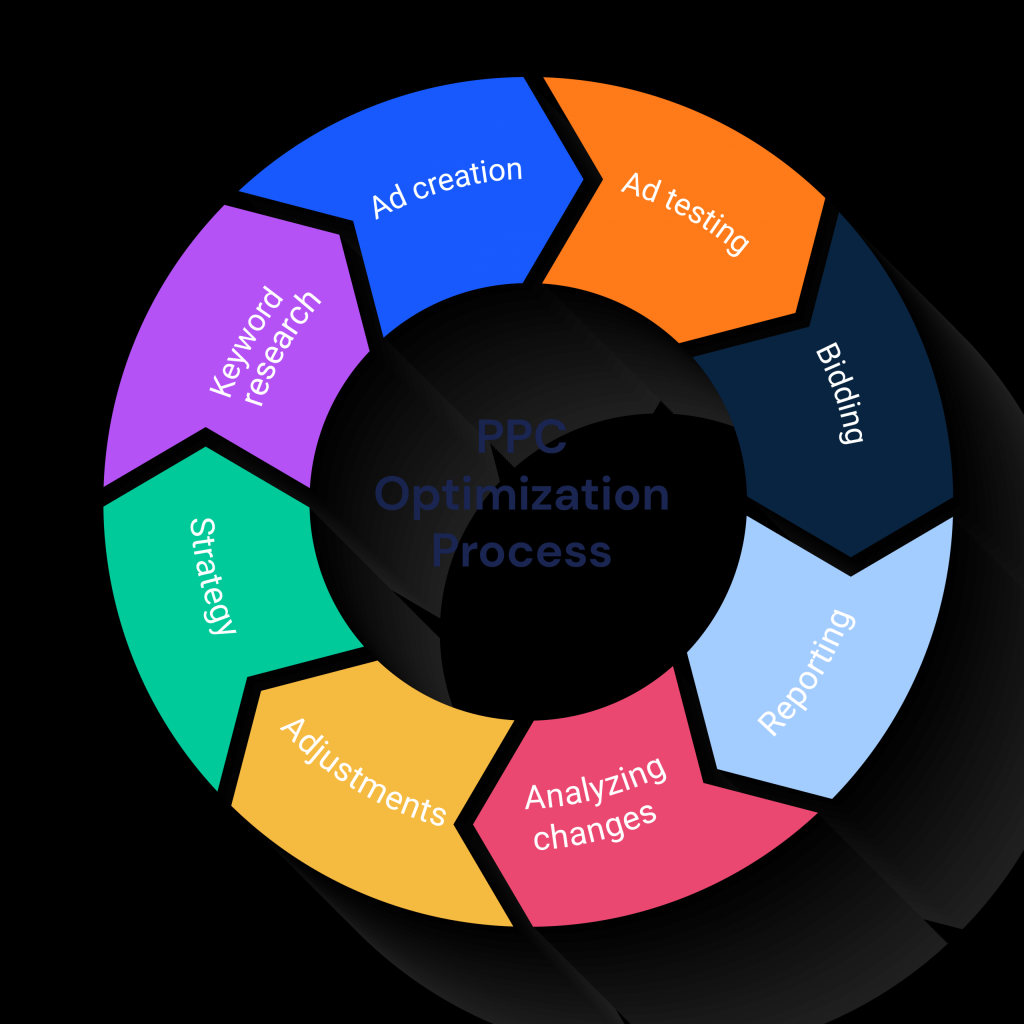What is Pay-per-Click (PPC)?

PPC (Pay-per-Click) advertising is a digital advertising model in which advertisers pay a fee each time a user clicks on one of their ads. Pay-per-Click (PPC) ads are displayed on search engine results pages (SERPs) and other websites, and they typically appear at the top or bottom of the page.
A model of digital advertising where the advertiser pays a fee each time one of their ads is clicked.
How does Pay-per-Click (PPC) is work?

Here’s how Pay-per-Click (PPC) advertising works:
- Advertisers create an ad campaign: Advertisers create an ad campaign on a PPC platform, such as Google Ads or Bing Ads. They choose the keywords they want their ads to target, set a budget, and create the ad copy.
- Users perform a search: When a user performs a search using one of the keywords targeted by the advertiser, the Pay-per-Click (PPC) platform runs an auction to determine which ads to display.
- Ads are displayed: The PPC platform displays the ads that are most relevant to the user’s search query, based on factors like bid amount, ad relevance, and landing page quality.
- Users click on the ads: When a user clicks on an ad, the advertiser is charged a fee. The fee is based on the maximum bid amount the advertiser set for that keyword, as well as other factors like ad relevance and landing page quality.
- Users are directed to a landing page: After clicking on the ad, the user is directed to a landing page, where the advertiser can provide more information about their product or service and encourage the user to take a desired action, such as making a purchase or filling out a form.
Pay-per-Click (PPC) advertising can be a highly effective way for advertisers to drive traffic to their websites and generate leads or sales. However, it requires careful planning and management to ensure that the ads are targeting the right keywords and are generating a positive return on investment (ROI).
What are the functions of PPC?

The PPC advertising is a very good digital way of advertising. And I am writing the functions of PPC here.
- Drive Traffic: PPC campaigns can be used to drive traffic to a website or landing page. Advertisers can target specific keywords, demographics, and locations to ensure their ads reach the right audience.
- Increase Brand Awareness: PPC can also be used to increase brand awareness by displaying ads to a wide audience. Even if people don’t click on the ads, they’ll still see the brand name and message.
- Generate Leads: PPC campaigns can be designed to generate leads by encouraging users to fill out a form or contact the business directly.
- Boost Sales: PPC can also be used to boost sales by promoting specific products or services. Advertisers can create targeted campaigns to reach people who are more likely to convert into customers.
- Measure Results: PPC provides detailed analytics and reporting, allowing advertisers to track their campaigns’ performance and make data-driven decisions. Advertisers can see which keywords are driving the most clicks and conversions and adjust their campaigns accordingly.
Overall, PPC is a powerful tool that can help businesses achieve their marketing goals, whether it’s driving traffic, increasing brand awareness, generating leads, boosting sales, or all of the above.
How To Use Digital PPC For Advertising?

First of all, I want to say that, the PPC advertising is very good and working way of advertising because of this, we can achieve more traffic through this ads.
Here are some ways to use PPC.
- Define Your Advertising Goals: Decide what you want to achieve with your PPC campaign. Do you want to increase website traffic, generate leads, boost sales, or increase brand awareness?
- Choose Your Advertising Platform: There are several digital advertising platforms you can choose from, such as Google Ads, Bing Ads, Facebook Ads, LinkedIn Ads, and more. Choose the platform that best aligns with your advertising goals and target audience.
- Set Up Your Campaign: Create your account and set up your campaign on the advertising platform you choose. This includes choosing your target audience, setting your budget, selecting your keywords or interests, and creating your ad copy.
- Create Your Ad Copy: Your ad copy should be engaging, relevant, and compelling. It should also include a clear call-to-action that encourages users to click on your ad.
- Launch Your Campaign: Once your campaign is set up, launch it and monitor its performance. Keep an eye on your metrics and adjust your campaign as needed to optimize your results.
- Measure Your Results: Use the analytics and reporting tools provided by your advertising platform to measure your campaign’s performance. Analyze your results and make data-driven decisions to improve your campaign and achieve your advertising goals.
How do I become a PPC expert?

If are you thinking to become a PPC expert? than you need to do some basis work because this work is very important to become a PPC digital advertising expert.
- Get Educated: Learn the fundamentals of PPC advertising, including concepts such as ad formats, targeting, bidding, and analytics. You can take online courses, read books, or attend workshops to gain a solid understanding of the field.
- Get Certified: Get certified in PPC advertising by taking exams and earning certifications from industry-leading providers such as Google Ads, Microsoft Advertising, and HubSpot. Certifications can demonstrate your expertise and enhance your credibility.
- Get Hands-On Experience: Apply your knowledge by working on real-world PPC campaigns. You can start by volunteering to manage campaigns for a non-profit organization or working as an intern for a digital marketing agency.
- Keep Up With Industry Trends: Stay up-to-date with the latest trends and developments in the PPC industry. Attend industry conferences, read industry publications, and participate in online forums and communities.
- Practice Continuous Learning: Continuously learn and experiment with different PPC strategies, tactics, and tools. Test your ideas and measure your results, and use data to refine your approach and improve your outcomes.
Remember, becoming a PPC expert is an ongoing process that requires dedication, hard work, and a passion for learning.
What plan to do (Pay-Per-Click) PPC digital advertising?

This platform is a good way to introduce the products into the digital platform. and If we will make a good plan to use this platform for my products then nobody can defeat you to increasing.
- Define Your Goals: Determine your PPC advertising goals, such as increasing website traffic, generating leads, boosting sales, or increasing brand awareness. Be specific and measurable in setting your objectives.
- Identify Your Target Audience: Understand the demographics, interests, and behaviors of your target audience. This will help you choose the right keywords, ad copy, and targeting options.
- Choose Your PPC Platform: Select the PPC platform that best aligns with your advertising goals and target audience. Popular PPC platforms include Google Ads, Bing Ads, and social media platforms such as Facebook and LinkedIn.
- Conduct Keyword Research: Research and select the most relevant and high-converting keywords for your PPC campaign. Use keyword research tools to find keywords that have high search volume and low competition.
- Develop Compelling Ad Copy: Write engaging and compelling ad copy that speaks to the needs and interests of your target audience. Ensure your ad copy includes a clear and concise call-to-action.
- Set Your Budget: Determine your PPC advertising budget and allocate it across your campaigns. Make sure your budget aligns with your advertising goals and is sufficient to achieve them.
- Define Your Campaign Settings: Define your campaign settings, such as geographic location, ad scheduling, language, and ad format. Ensure your settings align with your advertising goals and target audience.
- Launch Your Campaigns: Launch your campaigns and monitor their performance regularly. Make data-driven decisions to optimize your campaigns, such as testing different ad variations, adjusting your targeting, and bid strategies to improve your results.
Remember, PPC advertising requires ongoing planning, testing, and optimization to be successful.
Thanks,






Leave a Reply
You must be logged in to post a comment.